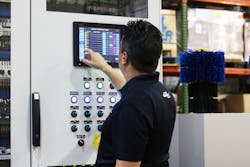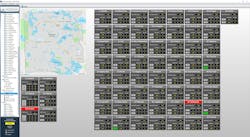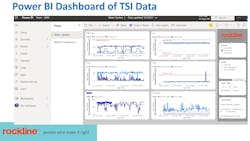As industrial companies modernize their operations, cloud computing has become a major force in a broader strategy to digitally transform processes, deliver better customer experiences, and enable more agile responses in the face of shifting marketplace demands.
Analyst firm Gartner expects worldwide spending on public cloud services to grow by 20.7% in 2023 to $591.8 billion, up from $490.3 billion in 2022. By 2025, Gartner anticipates that more than half (51%) of the IT budget for application software, infrastructure software, business process services, and system infrastructure will be directed to public clouds, overtaking traditional IT spending.
On the operations technology (OT) side, manufacturers also anticipate upsides to cloud computing, especially hybrid, multi-cloud deployments. Compared to traditional IT and OT infrastructure, hybrid cloud allows for remote access of critical data anywhere, providing workers intelligent insights that allow for better decision making while supporting faster and more predictive corrective actions. Cloud computing also gives companies access to scalable and pay-as-you-go computing resources and data storage, increasing companies’ overall agility and efficiency to support changing digital workflows without having to make upfront capital investments in costly hardware and software.
One of the biggest advantages of cloud computing is the ability to aggregate data from multiple sources to aid in comprehensive analytics and more effective decision making. For example, companies can collect data from devices on the shop floor or assets in the field using cloud services to aggregate the data and then leverage advanced analytics in the cloud to predict system failures and preemptively schedule maintenance services.
Cloud-based systems can also provide real-time visibility into supply chain operations, enabling a faster response in the face of disruptions as well as helping engineering teams collaborate and simulate product designs, reducing the need for physical prototyping.
While many enterprise applications have been steadily migrating to the cloud, OT data has not been moving at a comparable rate due to the associated costs, according to Steve Pavlosky, vice president, Proficy product management at GE Digital. That dynamic is changing as new platforms address the industrial data management challenge by enabling the consolidation of transactional data with OT/process data in the quest for higher-level insights. “As part of an enterprise IT strategy, the growing trend of cloud-based industrial data management now facilitates a more simplified and reliable movement of OT data to the cloud, spanning from device level to the enterprise,” Pavlosky explains. “Companies can leverage existing IT cloud investments and combine OT and enterprise data.”
Keep reading to learn how three industrial companies are using cloud computing to remake processes and better leverage industrial data for a competitive edge.
Sonny’s The CarWash Factory
Washing your car seems like a simple chore, but the modern express wash stations are a whole lot more sophisticated than a bunch of cleaning elements and a steady stream of hot water. Automated equipment, sensors, and a host of advanced communications and software capabilities ensure these systems wash cars efficiently and safely while minimizing water and chemical use.
To address the need for remote monitoring and support, the company turned to a cloud-based remote connectivity platform, which includes the StrideLinx VPN router and associated StrideLinx cloud service. The system provides access to HMIs and PLCs via virtual network computing or web services from within The CarWash Factory platform with a direct link to each device. This allows Sonny’s to monitor or control machine status from the HMI on a PC or smartphone, helping the team better support clients, including monitoring soap and wax levels so they can meet customer expectations for service-level agreements.
When selecting a cloud-based remote connectivity system like the StrideLinx platform, customers should pay close attention to user experience and flexibility, says Jonathan Griffith, product management team lead at AutomationDirect, a supplier of industrial automation equipment, which contracted with Sonny’s on this project.
The Sonny’s team was able to leverage documentation, online videos, and support for the platform prior to implementation, and the ease-of-use transferred to the early pilot deployments when customers were able to setup the router on their own and get the automation equipment online.
With this type of implementation, Griffith says it’s critical to consider security requirements as well as future scalability needs. “If you’re looking for a solution that supports five to 10 routers that’s one thing, but if you need to scale beyond that to hundreds of customers, you have to determine whether the cloud solution has the optimal network speed and server locations to provide the best services,” cautions Griffith. “And it’s not just scalability in terms of the number of sites, but also scalability of the feature set.”
Waterford Township’s Water and Waste Management
With more than 360 miles of water main, 355 miles of sewer, 19 production wells, three storage tanks, and 11 treatment plants, Waterford Township, in Oakland County, Mich., has its hands full when it comes to water and waste management.
Unlike the cyclic polling of the past, MQTT follows a strict report-by-exception publishing rule, which means field devices and other MQTT network clients only send data if there is a change in a monitored value. “MQTT solved the problem of the lengthy time it took to do polling,” says Frank Fisher, Waterford Township’s assistant IT director and SCADA and GIS manager. “Not focusing on the whole data set lets us see patterns that cause a problem, allowing us to diagnose problems quicker.”
Fisher said using the cloud was the preferred route, in part because it was possible to achieve greater fault tolerance and scalability than was possible running SCADA systems on premises. For example, if there’s an issue at the Ohio-based data center hosting the SCADA server, Fisher can have the entire system up and running via an online snapshot of that same server hosted in an Oregon data center in about a half hour. Perceptive is also able to perform controller updates remotely, and Fisher’s IT department doesn’t worry about maintaining hardware, allowing them to focus on other issues. “I don’t have to worry about hardware infrastructure, making sure power supplies are good or that there are no disk issues,” Fisher explains. “Cloud takes away the physical cost of ownership.”
Security was a big issue given that critical data now resides in the cloud, so Fisher and his team got to work installing firewalls, SSL certificates, and a robust password protection policy, among other safeguards. While the cloud was the right choice for Waterford Township, it comes down what works best for an individual company. “There are multiple paths to get to where you want to be—it comes down to how you want to proceed and what risks you are comfortable with,” he says.
Rockline Industries
When you’re a leader in the private label business, quality is everything to keeping customers happy.
Rockline Industries traditionally relied on mostly manual steps to track product quality at various stages throughout the manufacturing process for its marquee product—disposable wipes. However, it could often take months to zero in on what was causing a particular production quality problem.
If water quality falls outside a set of parameters, the new system lets everyone from plant floor operators, lab personnel, and managers visualize real-time data so they can be more responsive in taking corrective actions. “Not only can we get to the data easier, but we can see the casual impact between water data across plants, which lets us get into more predictive analytics,” says Craig Albert, IT director for Rockline.
The cloud was essential to the effort because of the sheer volume of data necessary for the predictive water quality analytics. “We didn’t want to do a SQL database and constantly be adding more storage,” Albert explains. “It made sense to have a repository in the cloud that could be elastic.”
Building on its existing FactoryTalk installation made sense rather ripping and replacing systems to unlock incremental value, adds Alan Stanfill, director of digital transformation for Gray Solutions.
With the water quality project successfully under its belt, Albert says Rockline has plans to expand the cloud-based analytics initiative to encompass cleaning and sanitation data. “This was a great project to showcase the power of business analytics,” he says. “It brought together the OT network with the business side and was a win-win for both of us.”




